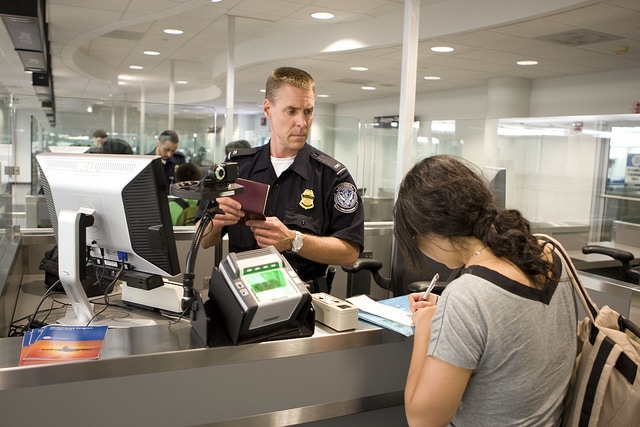When a a non-U.S. citizen applies for admission to USA, a decision is made by the CBP officer as to whether the applicant is admissible to the U.S.A. or inadmissible and should be removed or not allowed to enter the U.S.
Even a lawful permanent resident returning to the U.S. after an extended stay abroad, in certain situations can be questioned as a person applying for admission.
All travelers to the U.S.A. should know the following:
- Border Search Authority. Federal regulations are clear regarding CBP’s authority to conduct a search: “All persons, baggage, and merchandise arriving in the Customs territory of the United States from places outside thereof are liable for inspection and search by a Customs officer.” For those traveling to the U.S. in a vehicle, a CPB officer may stop, search, and examine any vehicle or search any trunk wherever found. However, CBP cannot conduct intrusive searches (such as strip searches) or repeated detentions unless there is a “reasonable suspicion” of an immigration violation or crime. Additionally, CBP’s policy requires that all searches be “conducted in a manner that is safe, secure, humane, dignified, and professional.”
- Electronic Devices Search (smartphones, laptops, tablets). CBP’s border search authority also includes the right to examine electronic devices, such as computers, disks, hard drives, cell phones, and other electronic or digital storage devices, without “reasonable suspicion”. CBP officers conduct border searches of electronic devices to determine whether a violation of U.S. law has occurred. While the U.S. Supreme Court has ruled that a warrantless search and seizure of digital contents of a cell phone during an arrest is unconstitutional in violation of the Fourth Amendment right against unreasonable searches and seizures, there appears to be an exception for individuals desiring to enter the U.S. If your electronic device is seized for further examination, which may include copying of data, you will receive a written receipt (Form 6051-D) that details what item(s) are being detained, who at CBP will be your point of contact, and the contact information (including telephone number) you provide to facilitate the return of your property upon completion of the examination. Unless extenuating circumstances exist, the detention of devices should not exceed 5 days.
- Discrimination and Coercion. An individual may not be searched on any discriminatory basis (e.g. race, gender, religion, ethnic background). Nevertheless, a search based on consideration of citizenship or travel itinerary that includes a narcotics source or transit country is not deemed unlawful. Additionally, CBP cannot threaten a person being questioned; if there is coercion, any statements obtained may be excluded in a subsequent removal proceeding under the Due Process Clause. You can file a complaint with the Office of Civil Rights and Civil Liberties within the U.S. Department of Homeland Security if you believe there has been improper discrimination, inappropriate questioning, or other civil rights and civil liberties violations.
- Right to Attorney. Any applicant for admission (including U.S. citizens) is not entitled to representation in primary or secondary inspections, unless he or she has become the focus of a criminal investigation and has been taken into custody. Foreign nationals attempting to come to the United States, either temporarily or permanently, have very few rights during the application and screening process.
- Right to Remain Silent, But Be Prepared to Answer Questions. Even though you have the right to remain silent, if you don’t answer questions to establish your citizenship, officials may deny entry to the U.S. or detain you for a search and/or questioning. CBP officers can ask people applying for admission to the U.S. almost any question. If you choose not to answer all or some of the questions, you can be denied admission to the U.S. or delayed by the CBP officer if selected for secondary inspection, search of your electronic devices. Make sure you can answer the following questions:
- What is the purpose of your visit? (what do you plan to do in USA)
- Where will you be staying? (address)
- Who will you be visiting? (name, address, contact phone number)
- How often do you travel to the U.S.? (for example, how many times a year; every 3 months)
When a non-US citizen applies for admission to the U.S., it’s important to be clear that your purpose for the visit to U.S.A. must be consistent with the visa category held. For example, if you are arriving on a tourist or visitor's visa, the purpose of the visit is to engage in tourist activities or visit family or friends, or if you a student, it’s to study, if you are a temporary worker it’s to work, and if you are returning as a permanent resident, the purpose must be to return to the U.S. as a place of your permanent residence.
Please read our guidance for lawful permanent residents returning to the USA who are facing request from the CBP to sign the form I-407 and to abandon permanent residency (aka green card).
#knowyourrights #CBP #DHS #USCIS #GreenCard #admissiontoUSA #I407 #search #seizure #bordersearch #electronicdevicesearch #righttoattorney #detention



 RSS Feed
RSS Feed